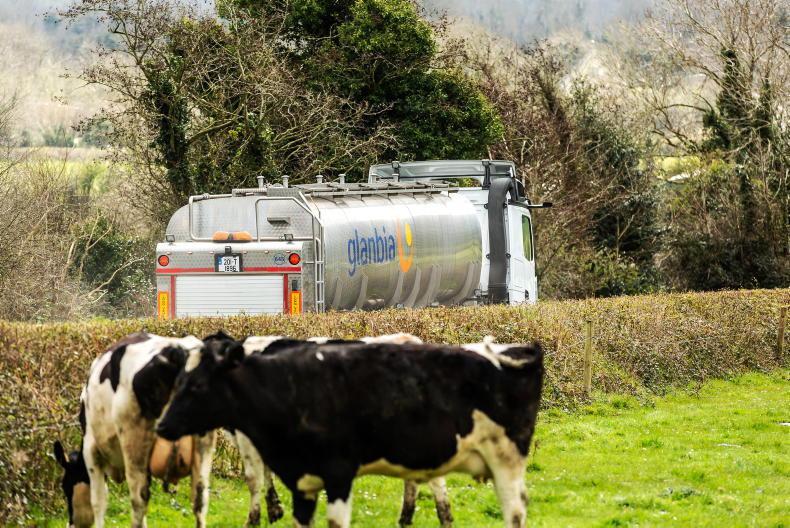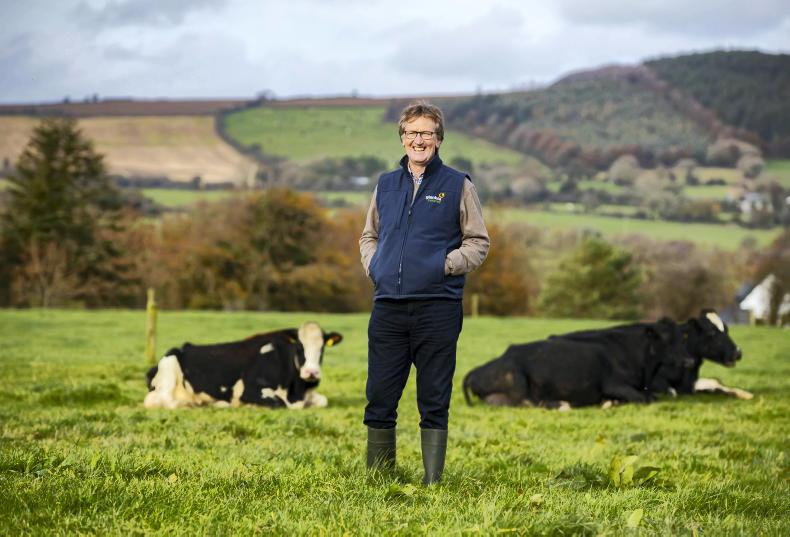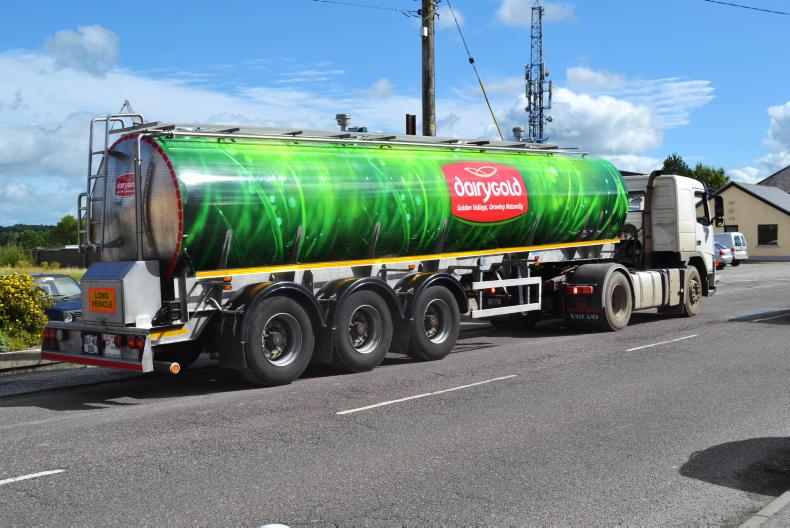Glanbia Ireland, the joint venture dairy business owned 60:40 between Glanbia Co-op and Glanbia plc, recorded a slight dip in profits last year, mainly as a result of lower sales.
Accounts for Glanbia Ireland’s 2020 financial year show the business recorded an operating profit of €81.3m last year, down 2% on the previous year.
However, operating profit margins remain healthy at 4.3%, slightly up on the previous year.
Glanbia said the main reason for the drop in operating profits was lower sales volumes in the year as turnover for 2020 fell 3% to just over €1.9bn.
The company said the clearance of these extra stocks in 2019 had resulted in higher than normal sales for that year
The company said the year-on-year decline in sales for 2020 was partly due to slightly weaker dairy prices but mostly related to lower sales volumes. The company said it had sold off high stock levels in 2019, which had been built on the back of a flush of milk supply in the final months of 2018.
The higher than normal stock levels meant Glanbia Ireland sold 410,000t of dairy products for 2019. Last year, these sales volumes reverted to more normal levels of just under 390,000t.
The company said the clearance of these extra stocks in 2019 had resulted in higher than normal sales for that year.
Profits
Overall, the business made a net profit after tax of €61m, which reflects the agreed profit after tax margin of 3.2% that Glanbia Ireland must make for its shareholders.
The Glanbia Ireland model ensures €30.5m, or 50% of the profits after tax, are held in the business for future investment and expansion.
The other 50% is paid as a dividend to the company’s two shareholders.
Earnings margins increased from 5.9% in 2019 to 6.5% last year
Under this arrangement, Glanbia plc receives a dividend of €12.2m from its 40% shareholding in Glanbia Ireland, while farmer-owned Glanbia co-op will receive just over €18.3m in dividends for its 60% majority stake in the company.
On a cash basis, Glanbia Ireland reported earnings (EBITDA) of €123.4m, up 6% on the previous year.
Earnings margins increased from 5.9% in 2019 to 6.5% last year. The company said it placed a strong emphasis on working capital during 2020 due to the volatility created by COVID-19.
Glanbia said it is already seeing strong growth in its 2021 milk supply
The increased focus on working capital and inventory management meant Glanbia was able to reduce its working capital costs by 10% last year to €153m and keep its overall operational costs flat despite processing 5% more milk last year.
In total, Glanbia Ireland processed a record 3bn litres of milk last year, with the volume processed during its week of peak supply increasing above 90m litres for the first time.
Glanbia said it is already seeing strong growth in its 2021 milk supply and is forecasting its total volumes to increase another 3% to 4% this year.
Glanbia Ireland’s net debt levels last year fell 20% to just under €231m
Overall, Glanbia Ireland’s balance sheet is in good shape. The net asset value of the business increased last year to €463m, while the company has continued to make progress in reducing its borrowings. Glanbia Ireland’s net debt levels last year fell 20% to just under €231m, which means its net debt to earnings level has reduced to a modest 1.9 times.
An Taisce’s objection to Glanbia’s proposed new cheese plant was rejected by the High Court this week. Glanbia’s proposed new plant is a joint venture with Dutch company Royal A-ware to produce gouda soft cheese. If this goes ahead it will improve product mix and help processing capacity concerns.
Glanbia Ireland sold just under 390,000t of dairy products last year. Most of this is accounted for by the group’s dairy ingredients division, which includes business-to-business products such as cheese, butter as well as its range of milk powder products like enriched milk powder, fat-filled milk powder and skimmed milk powders.
Dairy ingredients
Glanbia Ireland’s dairy ingredients division recorded sales of €1.2bn in 2020, down 2% on the previous year. Again this decline was linked to the exceptionally high sales volumes in 2019.
Consumer foods
Glanbia’s consumer food division, which includes its range of soups and branded products such as Avonmore, Kilmeaden and Truly Grass Fed, recorded a 2% drop in sales to €296m. Although these brands benefited from a spike in retail demand, Glanbia said it was not enough to offset the impact of lost food service sales.
The company said its consumer foods division has significant supply contracts with hospitality customers such as hotels, cafés, and restaurant chains, which were all hit hard by COVID-19 restrictions last year.
Agribusiness
In its agribusiness division, Glanbia Ireland recorded sales of €401m, down more than 6% on the previous year.
The company said it purchased almost 250,000t of grain from its tillage farmer suppliers last year, most of which was used to manufacture almost 495,000t of animal feed.
Glanbia said the volumes of feed and fertiliser sold through its agribusiness division were broadly similar to previous years and attributed the drop in sales to lower prices, particularly for fertiliser which was down as much as €50/t in the year.
The Glanbia Ireland results are good, but probably surprising in some aspects. Firstly sales are down 20,000t while raw milk purchasing is up. Glanbia puts it down to a slightly unusual 2019 sales boost carried over from 2018.
Most of the other dairy financial accounts we have profiled have seen sales go up in 2020 and subsequently profits up.
Likewise, the agribusiness division in other dairy co-ops saw a significant COVID bounce in sales and subsequent profit, but this doesn’t seem to have affected the Glanbia stores. Glanbia put this down to largely lower prices for fertiliser in 2020.
The 3.2% margin is reached again as per the agreement with shareholders meaning the €61m profit after tax that causes much angst among suppliers, is split €31m for reinvestment and €31m for the parent companies (the co-op and the plc). Recently Glanbia has restructured how to share out the co-op part of this cake (see Figure 1).
Almost €60m in debt was paid down (€290m to €230m), which is heavy lifting off the balance sheet.
The volumes of milk purchased (3bn litres) and processed are staggering in an Irish context and outside of Lakeland and Dairygold, none of the other Irish co-ops can hold a candle to the investment and growth in the milk pool over the last five years.
The High Court ruling will allay some of the fears of suppliers and board directors, but many suppliers are still reeling with the sudden introduction of the Glanbia peak penalty after investing hugely inside the farmgate and all of a sudden limited on sales.
Read more
Milk suppliers should watch financial results better
Glanbia parallels with Apple planning challenge
Glanbia Ireland, the joint venture dairy business owned 60:40 between Glanbia Co-op and Glanbia plc, recorded a slight dip in profits last year, mainly as a result of lower sales.
Accounts for Glanbia Ireland’s 2020 financial year show the business recorded an operating profit of €81.3m last year, down 2% on the previous year.
However, operating profit margins remain healthy at 4.3%, slightly up on the previous year.
Glanbia said the main reason for the drop in operating profits was lower sales volumes in the year as turnover for 2020 fell 3% to just over €1.9bn.
The company said the clearance of these extra stocks in 2019 had resulted in higher than normal sales for that year
The company said the year-on-year decline in sales for 2020 was partly due to slightly weaker dairy prices but mostly related to lower sales volumes. The company said it had sold off high stock levels in 2019, which had been built on the back of a flush of milk supply in the final months of 2018.
The higher than normal stock levels meant Glanbia Ireland sold 410,000t of dairy products for 2019. Last year, these sales volumes reverted to more normal levels of just under 390,000t.
The company said the clearance of these extra stocks in 2019 had resulted in higher than normal sales for that year.
Profits
Overall, the business made a net profit after tax of €61m, which reflects the agreed profit after tax margin of 3.2% that Glanbia Ireland must make for its shareholders.
The Glanbia Ireland model ensures €30.5m, or 50% of the profits after tax, are held in the business for future investment and expansion.
The other 50% is paid as a dividend to the company’s two shareholders.
Earnings margins increased from 5.9% in 2019 to 6.5% last year
Under this arrangement, Glanbia plc receives a dividend of €12.2m from its 40% shareholding in Glanbia Ireland, while farmer-owned Glanbia co-op will receive just over €18.3m in dividends for its 60% majority stake in the company.
On a cash basis, Glanbia Ireland reported earnings (EBITDA) of €123.4m, up 6% on the previous year.
Earnings margins increased from 5.9% in 2019 to 6.5% last year. The company said it placed a strong emphasis on working capital during 2020 due to the volatility created by COVID-19.
Glanbia said it is already seeing strong growth in its 2021 milk supply
The increased focus on working capital and inventory management meant Glanbia was able to reduce its working capital costs by 10% last year to €153m and keep its overall operational costs flat despite processing 5% more milk last year.
In total, Glanbia Ireland processed a record 3bn litres of milk last year, with the volume processed during its week of peak supply increasing above 90m litres for the first time.
Glanbia said it is already seeing strong growth in its 2021 milk supply and is forecasting its total volumes to increase another 3% to 4% this year.
Glanbia Ireland’s net debt levels last year fell 20% to just under €231m
Overall, Glanbia Ireland’s balance sheet is in good shape. The net asset value of the business increased last year to €463m, while the company has continued to make progress in reducing its borrowings. Glanbia Ireland’s net debt levels last year fell 20% to just under €231m, which means its net debt to earnings level has reduced to a modest 1.9 times.
An Taisce’s objection to Glanbia’s proposed new cheese plant was rejected by the High Court this week. Glanbia’s proposed new plant is a joint venture with Dutch company Royal A-ware to produce gouda soft cheese. If this goes ahead it will improve product mix and help processing capacity concerns.
Glanbia Ireland sold just under 390,000t of dairy products last year. Most of this is accounted for by the group’s dairy ingredients division, which includes business-to-business products such as cheese, butter as well as its range of milk powder products like enriched milk powder, fat-filled milk powder and skimmed milk powders.
Dairy ingredients
Glanbia Ireland’s dairy ingredients division recorded sales of €1.2bn in 2020, down 2% on the previous year. Again this decline was linked to the exceptionally high sales volumes in 2019.
Consumer foods
Glanbia’s consumer food division, which includes its range of soups and branded products such as Avonmore, Kilmeaden and Truly Grass Fed, recorded a 2% drop in sales to €296m. Although these brands benefited from a spike in retail demand, Glanbia said it was not enough to offset the impact of lost food service sales.
The company said its consumer foods division has significant supply contracts with hospitality customers such as hotels, cafés, and restaurant chains, which were all hit hard by COVID-19 restrictions last year.
Agribusiness
In its agribusiness division, Glanbia Ireland recorded sales of €401m, down more than 6% on the previous year.
The company said it purchased almost 250,000t of grain from its tillage farmer suppliers last year, most of which was used to manufacture almost 495,000t of animal feed.
Glanbia said the volumes of feed and fertiliser sold through its agribusiness division were broadly similar to previous years and attributed the drop in sales to lower prices, particularly for fertiliser which was down as much as €50/t in the year.
The Glanbia Ireland results are good, but probably surprising in some aspects. Firstly sales are down 20,000t while raw milk purchasing is up. Glanbia puts it down to a slightly unusual 2019 sales boost carried over from 2018.
Most of the other dairy financial accounts we have profiled have seen sales go up in 2020 and subsequently profits up.
Likewise, the agribusiness division in other dairy co-ops saw a significant COVID bounce in sales and subsequent profit, but this doesn’t seem to have affected the Glanbia stores. Glanbia put this down to largely lower prices for fertiliser in 2020.
The 3.2% margin is reached again as per the agreement with shareholders meaning the €61m profit after tax that causes much angst among suppliers, is split €31m for reinvestment and €31m for the parent companies (the co-op and the plc). Recently Glanbia has restructured how to share out the co-op part of this cake (see Figure 1).
Almost €60m in debt was paid down (€290m to €230m), which is heavy lifting off the balance sheet.
The volumes of milk purchased (3bn litres) and processed are staggering in an Irish context and outside of Lakeland and Dairygold, none of the other Irish co-ops can hold a candle to the investment and growth in the milk pool over the last five years.
The High Court ruling will allay some of the fears of suppliers and board directors, but many suppliers are still reeling with the sudden introduction of the Glanbia peak penalty after investing hugely inside the farmgate and all of a sudden limited on sales.
Read more
Milk suppliers should watch financial results better
Glanbia parallels with Apple planning challenge










SHARING OPTIONS